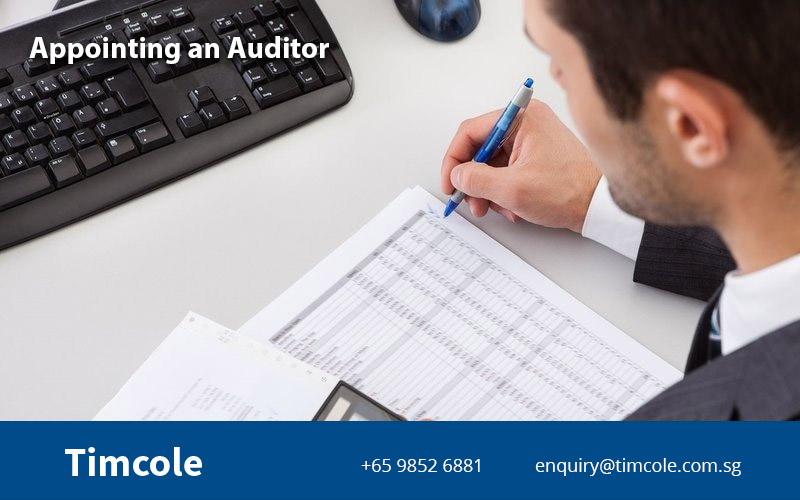It is mandatory for all companies (unless exempted from audit requirements under Company Act) to appoint an auditor within 3 months of it’s incorporation. The company auditor serves to ensure that the account statements of the companies are true.

Appointing an Auditor
The Appointment Process in Singapore
In Singapore, only public accountants or accounting firms recognized and approved by the Accounting and Corporate Regulatory Authority (ACRA) can be appointed as a company auditor.
The auditor will hold its position until the company’s annual general meeting (AGM), held once a year. During the meeting, discussion regarding the appointment of a new auditor or re-appointing the current entity should be made. Upon the new appointment, the new or existing auditor will hold office until the next AGM, and so on.
Alternatively, the company may request for the Registrar to appoint an auditor for them instead.
The Role of Auditors
The role of auditors is to affirm that the company’s account statements are true in providing the current company’s financial performance and comply with the reporting requirements set by Company Act.
Auditors should be allowed access to the company’s accounting records, or any information required for auditing purposes.
Small Company Exemption
‘Small’ companies are exempt from audit requirements. The appointment of an auditor for these companies are not required, neither is the submission of any audited financial statements.
Private companies are considered ‘small’ if they satisfy any 2 of the criteria below:
- The company’s annual revenue is $10 million or less.
- The company’s total assets value to $10 million or less.
- The company has 50 or fewer employees.
Small companies that act as a subsidiary to a parent company, are only exempted from audit requirements if they are classified as a “small group”.
To be classified as a “small group”, the company must satisfy any 2 of the criteria below for 2 consecutive financial years before the current financial term:
- The group’s combined revenue is $10 million or less.
- The group’s total assets value to $10 million or less.
- The group has 50 or fewer employees.
Dormant Company Exemption
Dormant companies that fit the criteria below can also be exempt from audit requirements:
- The company has been dormant since it’s incorporation.
- The company has been dormant since the beginning of the current financial year.
A company is considered dormant if there are no accounting transactions and will no longer be considered so once a transaction occurs.
The following below are not considered accounting transactions:
- Appointment of a company secretary
- Appointment of an auditor
- Bookkeeping
- Any payment transactions required by the law
Exception to Exemption
Even if your company is qualified to be exempt from audit requirements, it may still be instructed by the Registrar to comply with the auditing. By requesting so, the Registrar believes that the company has breached Company Act law relating to accounting records (section 199 of the CA) or financial statements (section 201 of the CA) and require auditing to prove otherwise.
How Timcole can Help You
To learn more on audit requirement or whether your business is eligible for exemption, Contact us to find out more today.
Timcole is one of the leading company incorporation and accounting firm based in Singapore. Our wide range of professional services serve as a one-stop solution for your business, offering you the most affordable price for services conducted with the highest level of excellency.

